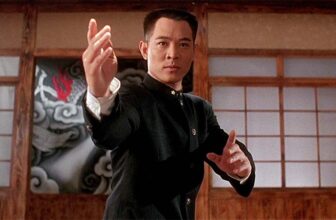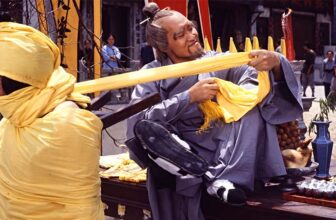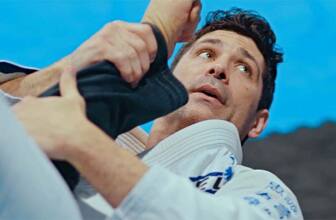
Some people believe that martial arts films are too violent. Many are, to be sure, but the finest ones have the same relationship with violence that Astaire and Rogers have with romance: no one believes they take it seriously, but it provides them a reason to do some fantastic choreography.
Humor lurks beneath the surface of most good martial arts films. Sometimes it rises to the surface, like in Stephen Chow’s “Kung Fu Hustle.” The joke is based on joy rather than humor: the characters have defied both gravity and science.
It’s quite satisfying to be able to jump into the air, spin in a circle, and kick six, seven, eight, or nine adversaries before landing in a beautiful crouch.
Watching action movies is a thrill that is hard to compare with anything else, save betting on your favorite athletes or teams. If you are looking for a reliable online bookmaking company, go to https://bookmaker-ratings.net.za/review/william-hill-review/.
Realists complain that such feats are impossible. They have to be, right? The thing with Astaire and Rogers was that they were doing it in lengthy, uninterrupted takes, and we could see it.
Stephen Chow employs hidden cables, elaborate effects, trick camera angles, trampolines, and anything else that comes to mind. We know it, and he knows it, too. But his expertise is not diminished by the ‘deceit’, since a martial arts performer must be a fantastic athlete, despite all the wires and effects in the world.
Hang your ordinary movie star from a wire and he’ll appear like he’s been caught by the Pequod!
Chow’s eighth film as a director and 61st job as an actor (including that done for TV) is “Kung Fu Hustle.” He is 41 years old, and has been busy. His only other picture that I’ve seen is “Shaolin Soccer” (2002), Hong Kong’s highest-grossing action comedy.
Miramax bought it, kept it off the market for two years, shortened it by 30 minutes, and re-dubbed it: Yes, Harvey Weinstein added subtitles to the English dialogue. The film was released a year ago, and I wrote a review in which I offered my most logical argument of the relativity theory of star ratings.
“Kung Fu Hustle”. This is the type of film that makes you chuckle periodically and smile the rest of the time. Chow must have worked superhumanly hard to avoid singing a subtitled version of “Let Me Entertain You” – or, no, I’ve got a better example: “Make ’em Laugh,” a Donald O’Connor tune from “Singin’ in the Rain.” O’Connor smashed through boards and bricks, struggled with a dummy, raced up one wall and through another, and sang the entire while. Stephen Chow does not sing, yet he embodies the same spirit.
The film is set in the Shanghai ghetto of Pig Sty Alley. It’s overseen by a dumpy landlady (Yuen Qiu), who walks around in slippers and always has one of those cartoon smokes in her lips no matter what.
The Axe Gang terrorises Shanghai, although it mainly avoids Pig Sty Alley since the pickings are sparse. When the fake gang members are confronted by the local kung-fu warriors, the real gang steps in to get retribution.
The Axe Gang stands out because they all wear black suits and top hats and wield axes. That will set you apart. I’m reminded of Jack Lemmon’s anecdote about seeing Klaus Kinski purchase a hatchet at Ace Hardware.
The fight between the Pig Stygians and the Axe Gang serves as a pretext for a succession of episodes in which stylized violence achieves a state of rapture. Of course, nothing we see is possible, but the film doesn’t even pretend it is; perhaps everyone is suffering similar hallucinations.
One of the laughs is that unexpected individuals, such as the landlady and local, middle-aged tradesmen, turn out to be better warriors than the experts.
Chow not only appears and directs, but he also co-wrote and co-produced the film. We get the impression that his comedies are created in the tradition of Buster Keaton, with gags devised on the fly and everyone revolving around the star, who is physically competent, courageous, and witty.
Chow portrays Sing, who also appears in “Shaolin Soccer” and at least six additional films. He’s an impostor this time, posing as an Axe Gang member in order to run a shakedown ring in Pig Sty Alley.
Consider how difficult it will be when the actual Axe Gang arrives and he gets in trouble with everyone. By the end of the film, he’s engaged in a kung-fu brawl with The Beast (Leung Siu Lung). The joke is that most of what Sing knows about kung fu he learnt as a boy from reading a worthless pamphlet sold to him by a scam guy.
You may dislike martial arts films, whether hilarious or not. So, why have you gotten this far?
Alternatively, you may enjoy graceful, and poetic epics such as “Crouching Tiger, Hidden Dragon” or “House of Flying Daggers.” Those are not characteristics seen in “Kung Fu Hustle.” I described it as “like Jackie Chan and Buster Keaton meeting Quentin Tarantino and Bugs Bunny” when I watched it at Sundance. See how worked up you become while watching this movie!






